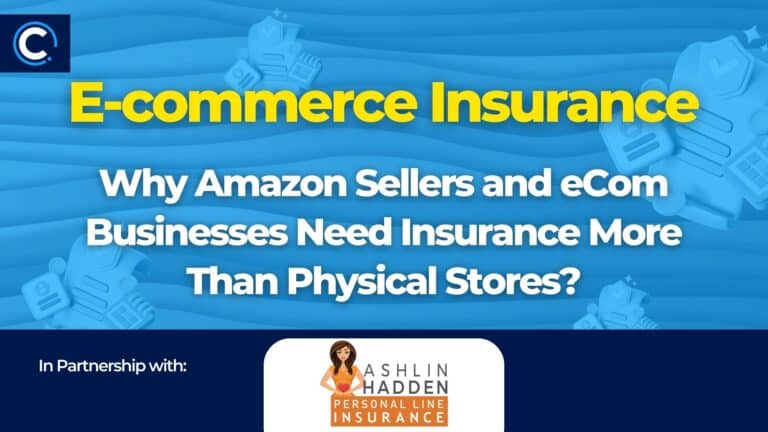
Table of Contents

With each passing year, the ever-changing digital landscape brings forth a handful of online events that carry immense importance for entrepreneurs operating in the virtual realm. Among these, Amazon Prime Day stands out as a significant milestone. This annual shopping extravaganza has transformed into a commercial phenomenon, presenting unparalleled chances for business owners to amplify their sales, enhance brand visibility, and propel their enterprises to unprecedented levels of success.
As a seller yourself, you know Prime Day is not just for shoppers. It serves as a catalyst to catapult many businesses higher up Amazon’s SERPS and (hopefully) achieve more visibility and brand recognition. Prime Day also enables businesses to leverage Amazon’s marketing tools and promotional opportunities to expand their reach, connect with new customers, and build long-term relationships.
However, if one’s online store isn’t properly protected, Prime Day (as well as any consumer-centric event) can become a nightmare for business owners. In this blog, we will uncover why third-party Amazon sellers are more vulnerable to financial calamities than their brick-and-mortar counterparts, and why safeguarding one’s business is especially important on big days like Prime Day.
Amazon’s Insurance Requirements for Sellers
If you are an Amazon seller, you are likely very aware of Amazon’s insurance requirements. But if you are not, here are the Cliffs Notes:
- If your online store has exceeded $10,000 in gross sales in one month, even if not consecutively, you are required to obtain general liability and product liability insurance within 30 days. You may purchase either commercial general, excess, or umbrella liability insurance – depending on what you sell and what your business needs are.
- Policy limits must be at least $1 million per occurrence and in aggregate, covering all liabilities that may result or occur in conjunction with your business’ operations or products.
As insurance agents, we often hear: “I haven’t hit the $10,000 a month cap, so I don’t need insurance” or “I already have general and product liability coverage, so I’m good.” Both these mindsets are flawed, and here is why…
Ecommerce Stores Need Liability Insurance More Than Brick-and-Mortar Stores
In all transparency and fairness, brick-and-mortar businesses should also carry insurance. This blog is NOT intended to downplay the importance of insurance for physical stores. However, physical storefronts deal with operational, customer, and product calamities generally on a smaller, more local scale.
Selling on Amazon (or other virtual platforms) presents distinct challenges compared to physical stores. This is particularly true during big online events like Prime Day, Black Friday, and Cyber Monday. But why?
Online Stores Have More of a Reach

Selling on Amazon brings about a tremendous advantage: a global audience. Within a mere day, a seller has the potential to sell their products to customers residing in various states and (nearly) any country. This expansive reach enables eCom sellers like yourself to push a substantially higher volume of products compared to a small, local business situated in rural areas.
While this is a huge advantage, it also means it’s a huge liability. According to SellerApp: “In 2021, Amazon shipped over 5 billion items to customers around the world, with an average Order Defect Rate (ODR) of 0.30%. That means out of every 1000 orders, three were returned due to defects.”
And while that number may not seem like a lot, remember it only takes 1 defective product that caused bodily injury, property damage, or emotional distress to result in a lawsuit.
Huge consumer events like Prime Day almost always increase the number of consumers exposed to a product. In turn, this leads to a greater risk of dissatisfied customers.
In the age-old battle between patent holders and potential infringers, Amazon’s NPEP emerges as a formidable peacemaker, bridging the divide and offering a fair playing field for all parties involved. The program revolutionizes the patent dispute landscape within Amazon, replacing the burdensome and costly litigation process, with an efficient, cost-effective, and transparent alternative.
Furthermore, the NPEP enhances transparency in patent enforcement and dispute resolution within Amazon’s ecosystem. The involvement of independent patent attorneys in evaluating the patents’ technical aspects, instead of non-technical Amazon employees, mitigates perceived biases and increases overall credibility. This transparency and credibility contribute to a more robust patent system, fostering trust and confidence among sellers.
Online Businesses Lack Face-to-Face Customer Interactions

One of the notable distinctions between physical and online merchants lies in the absence of in-person interaction with customers. This significant contrast emphasizes the importance for Amazon sellers to prioritize liability insurance.
The lack of face-to-face engagement between Amazon sellers and their customers presents a unique challenge when it comes to ensuring customer satisfaction and resolving issues. In a traditional brick-and-mortar store, sellers can engage in real-time conversations, address concerns promptly, and provide immediate assistance. This direct interaction allows business owners to establish trust, defuse potential conflicts, and deliver a positive customer experience.
In contrast, eCommerce platforms like Amazon heavily rely on digital interfaces, limiting the opportunities for direct customer engagement. This communication gap heightens the risks associated with miscommunication, misunderstandings, and unresolved disputes.
The significance of liability insurance for Amazon sellers becomes evident as it serves as a vital shield in the absence of in-person interaction. This kind of coverage provides a protective layer against potential liabilities that may arise from online transactions. With the inability to assess customers’ needs and preferences face-to-face, sellers may inadvertently face challenges related to product quality, shipping delays, or misrepresentations. Such disputes have the potential to escalate rapidly, resulting in adverse reviews, reputational harm, and financial setbacks. Liability insurance acts as a safety net by covering legal expenses, settlement costs, and potential damages that may arise from these incidents.
Amazon Sellers Are More Reliant on Third-Party Operations
If you are a private label seller, you likely can relate to the level of dependency third-party sellers have on external services to get their products into customer’s hands.
Suppliers and manufacturers are needed to make and fulfill orders. Inspection teams are often recruited to identify defects in products. Cargo shipping companies are utilized to move units across seas, and delivery trucks transport products to warehouses and FBA centers. Do you see where we are going with this?

No matter how tight your supply-chain operations are, unforeseen defects or errors can occur during manufacturing and shipping. These can lead to faulty products reaching consumers.
Due to the nature of eCommerce, Amazon sellers never even SEE the majority of products they sell, while brick-and-mortar business owners do. This distinction makes liability insurance particularly important for online business owners, as it shoulders the financial burdens that may arise from product claims – including legal fees, settlements, or judgments.
During major events such as Prime Day, Black Friday, and Christmas, companies operating in the supply chain industry experience maximum strain as they face mounting pressure to expedite product turnover at an unprecedented pace compared to any other period. Within this demanding environment, minor errors are very likely to occur which can lead to not-so-minor repercussions – particularly for the sellers involved.
General and Product Liability Insurance is Often Not Enough for Amazon Sellers
We hate to be the bearer of bad news, but Amazon’s insurance requirements serve to protect Amazon, not you. This means two things:
- Liability insurance should be obtained by all sellers on all eCommerce platforms regardless of monthly sales or the platform’s insurance requirements. In other words, if your monthly revenue is below the $10,000 barrier, that doesn’t mean you shouldn’t have it
- Apart from general and product liability insurance, there are several other insurance policies that you should really consider due to risks specific to eCommerce that are not as frequently encountered by physical stores.
Cyber Liability Insurance
In today’s interconnected world, cyber threats pose a significant concern for online businesses. Unlike brick-and-mortar stores, Amazon sellers heavily rely on digital platforms, customer databases, and online transactions to operate their businesses. This reliance makes them vulnerable to cyber-attacks, data breaches, and other online security breaches.
Cyber liability insurance provides coverage for financial losses, legal expenses, and reputation damage resulting from such incidents. It helps with expenses related to data recovery, legal notifications, public relations, and regulatory compliance. Perhaps most importantly, cyber insurance helps cover the costs of notifying customers of the breach and even offering credit protection. In turn, this can help negate the potential flood of bad reviews and preserve your brand’s reputation.
In fact, cyber attacks are more likely to happen during big consumer events like Prime Day and Cyber Monday than any other time of the year.
Cargo and Transit Insurance
Brick-and-mortar business owners typically have the privilege of inspecting products for damage when they are shipped in-house. Amazon sellers – particularly those utilizing fulfillment by Amazon services – lack this advantage.
Damaged or lost inventory is expensive to replace. Cargo insurance will replace the monetary value of products that suffer damage, theft, or loss while in transit.
As previously mentioned, during high-traffic consumer holidays, the strain imposed on supply chain operations often leads to instances of lost or damaged inventory.
Product Recall Insurance
While both physical stores and virtual businesses are equally prone to product recalls, the aftermath of a product recall for online sellers can be significantly more challenging and costly to bounce back from.

Given the intricate global supply chains and diverse product offerings, eCommerce sellers face heightened risks associated with product defects, contamination, or safety concerns. Additionally, due to the digital nature of operations and limited face-to-face interactions, merchants must respond swiftly and efficiently when their product (or even a component of it) needs to be pulled from the shelves.
Firstly, Amazon sellers encounter the unique challenge of navigating diverse jurisdictions and complying with varying regulations based on the states or countries in which they sell their products.
Secondly, due to their extensive reach, sellers face the daunting task of notifying customers about recalls, refunding customers, and retrieving all the products they have 1) sold 2) have stored in facility, and 3) are currently in transit. As you can imagine, this process is time-consuming and costly.
Product recall insurance not only helps with the financial burden of a recall, but it also helps alleviate reputational damage. It enables sellers to promptly address recalls, then communicate and provide solutions to their customers.
With the customer reach that events like Prime Day and Cyber Monday offer sellers, if one of your products ends up in a recall situation, product recall insurance can shoulder much of the responsibility associated with the aftermath.
Conclusion
More than likely, you have spent an exorbitant amount of your time and money creating and building your online store. Trust us when we say that you do not want to lose it all because you didn’t want to properly insure your business. It’s just not worth the risk.
If you are currently not insured or are but you aren’t confident that your business and assets are properly protected, Ashlin Hadden Insurance can help.
We are a brokerage agency that has been in the eCom space for almost 7 years. Ashlin Hadden Insurance specializes in helping Amazon, Walmart, & eCommerce sellers protect their business, finances, and assets by working closely with you to understand your business model, operations, and budget. We work with 50 premier insurance carriers that we’ve vetted to ensure that you are getting the full protection you deserve. At Ashlin Hadden, we are committed to full transparency in our pursuit to get you the peace of mind you deserve as your online business thrives.
Interested in getting a free audit and quote on your business? Click here to Contact Ashlin Hadden Insurance
Author: McClain Warren, Marketing Director and Brand Ambassador at Ashlin Hadden Insurance

